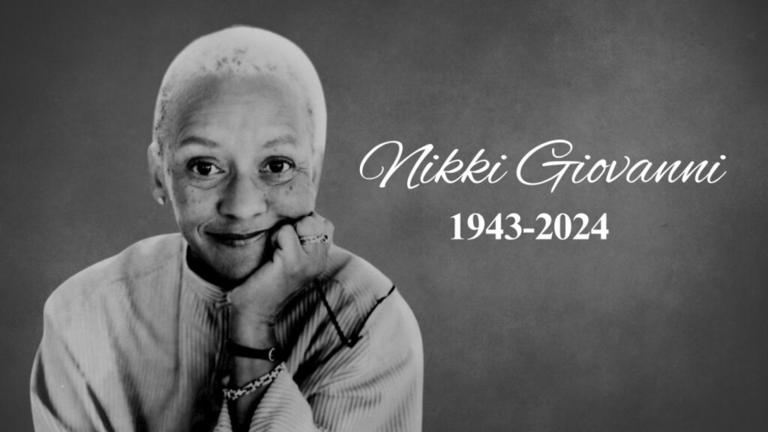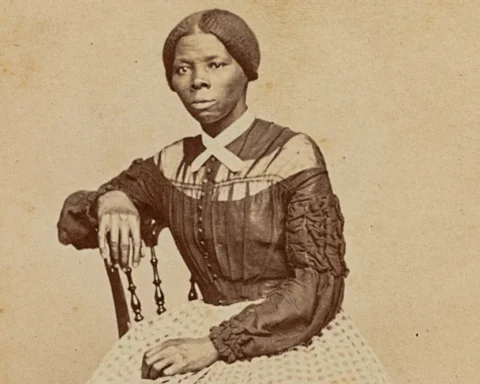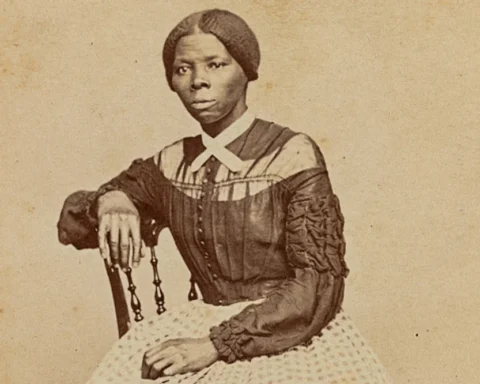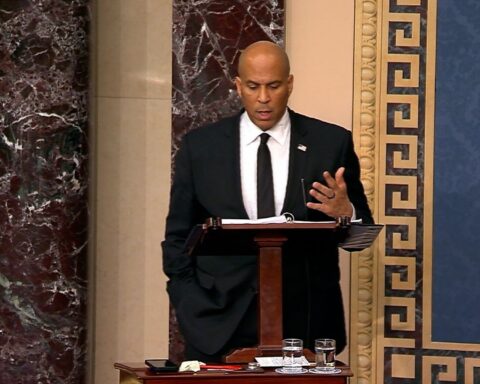The three-hour drive Kwame Alexander had taken countless times from Nikki Giovanni’s home in Christiansburg, Virginia, to Washington, D.C., felt different on Thursday morning. Three days prior, he had stood by Giovanni’s bedside with her family and a handful of close friends as the legendary poet and activist took her last breath.
Giovanni died Monday at age 81 of complications from lung cancer. Alexander spent the week with her wife, Virginia C. Fowler, and others helping with funeral arrangements.
But in the solitude of his car as he returned home, Alexander revisited the unique bond he and Giovanni developed over decades, and how it crystallized the impact she had on the lives of countless Black writers.
“This drive is tough but necessary for me to be alone with my thoughts,” said Alexander, 56, a New York Times bestselling author of young adult fiction. He and Giovanni had a tumultuous start to their friendship. Alexander took three classes under Giovanni while at Virginia Tech and received C’s in each.
He was not happy. “When I left college, I was done with her,” Alexander said.
Over the years, they became cordial. Giovanni even asked Alexander to contribute to an anthology about grandfathers after he had lost his.
Then, seven years after he graduated, Giovanni was quoted in an article about Alexander, saying, “If I can have a literary son, I’d like to think it would be Kwame Alexander.” He was floored.
In 2007, she invited him over for dinner, exposing him for the first time to lamb chops and Brussels sprouts. Fowler made scalloped potatoes. Late in the evening, Alexander cried. Giovanni did, too, although she did not know what brought on his tears.
Born Yolande Cornelia Giovanni Jr., she became an icon of the Civil Rights Movement in the 1960s, penning powerful, self-affirming poems. Her first book, “Feeling Black, Black Talk,” and the poem “Nikki-Rosa” were the start to a career that spanned six decades and dozens of books for readers of all ages.
She was an outspoken advocate for Black people and gender equality in her work, lectures and interviews, and was awarded a 2024 Emmy for exceptional merit in documentary filmmaking for “Going to Mars: The Nikki Giovanni Project.” Her final book of poetry, “The Last Book,” will publish next year.
In addition to 35 years as an English professor at Virginia Tech, from which she retired in 2022, Giovanni taught and lectured at several colleges, touching the lives of many young writers.
“Her death struck me in a way I can’t describe,” said author Suzetta Perkins, who first saw Giovanni as a student at Fayetteville State University. “I was saddened, hurt to hear of her passing.”
She met Giovanni in 1999 as an aspiring author. “While Ms. Giovanni didn’t know it, maybe she sensed it, her sweet spirit took a second to tell me to be my authentic self,” Perkins said. She was inspired. The next year, she wrote her first novel, “Behind the Veil.” Perkins has gone on to write 14 novels and was recently acknowledged by Chosen Pen Publishing with its Presidential Lifetime Achievement Award for service.
Marita Golden was a sophomore at American University in 1969 when Giovanni selected one of her poems for an anthology. It was “major,” said Golden, who went on to become a prolific author of more than 20 books, a creative writing professor and a co-founder of the Hurston/Wright Foundation, an organization that honors Black writers.
Golden and Giovanni worked together on various events and projects. Her death left Golden melancholy.
“She did something very special for poetry. She made poetry this home, this place for people to live in,” Golden said. “I can’t tell you the number of college students or high school students who, when I’ve assigned one of her poems or a book, already knew her. They already loved her. She’d already changed their lives.”
Giovanni’s power was multidimensional. She wrote romantically about love and spoke intensely about race. Her commitment to gender equality was unwavering. Her passion for Black people was ironclad. And through the years, she made herself an accessible icon.
“Nikki was brilliant because she was deep,” Golden said. “She was symbolic. She was funny. And she was accessible. She wanted to be called ‘Nikki.’ Her poetry had this pulse, this life. She was very authentic. She spoke her mind and took a lot of risks in what she said, risks in what she did. Her poems were like living things. And I think that’s why people were drawn to it, drawn to her.”
Sharon Foster can attest to that. A poet who works as a communications specialist in the Washington, D.C., area, Foster encountered Giovanni at events at Busboys and Poets, a local lounge that features author readings, poetry and spoken-word performances.
Giovanni was in the audience as Foster read from her first book, “Live Lightly: A Summer of Poetry.” As she left the stage, Giovanni “reached out to me and said, ‘All right, now. I hear you, Sista.’ To have someone so esteemed give that sort of affirmation about my work really just blew me away. We have really lost a treasure.”
Especially Alexander. He and Giovanni built a bond through conversations about Black people and literature while enjoying libations and savory food, often prepared by Giovanni.
He recalled a literary event in Harlem where he interviewed his friend. “I prepared 10 questions I knew I would ask her,” he said. “I asked her the first question. Her answer lasted an hour. It was over. That was it. She got a standing ovation. She fed you with a lot of hope, a lot of love, a lot of family.”
They traveled to West Africa together twice. When his mother died in 2017, Giovanni attended the funeral. Alexander told her, “You didn’t have to be here.” She gave him some choice words and said, “You need to know you still have a mother.”
It was that kind of passion and commitment that resonated with countless readers and authors, Golden said.
“Nikki’s cannon is universal,” she said. “It’s irreplaceable, and it has as much energy and relevance today as when she first wrote the poems. And because they’re reflective, they’re her autobiography. And her autobiography was about generosity, about being Black and proud of that, and honoring family and honoring your roots — but also being human. And so that never goes away. That’s always in style.”
Alexander agreed that Giovanni’s reach has been “expansive, and it’s majestic, and it’s magnificent. She taught us through her writing, through her living. … She taught us how to speak our voice. Nikki was unfiltered. She said what was on her mind, what she believed. If we really learned anything from her, it is to be bold, to lift our voices, to write what we want to write, to speak up about the things that matter, and to give a voice to the voices of those like her who came before us. She was unapologetically a matter-of-fact Black. As writers, she taught us that through her life.”
“It was guilt,” he said. “I had been angry for so long and had said things about her. She said, ‘If I gave you a C, you deserved it. My goal was to help you become who you needed to be. And I think I did that.’ That’s who she was. My mother taught me how to love books. My father introduced me to all facets of literature. Nikki Giovanni taught me how to make words paint on a page and how to be a better man.”





